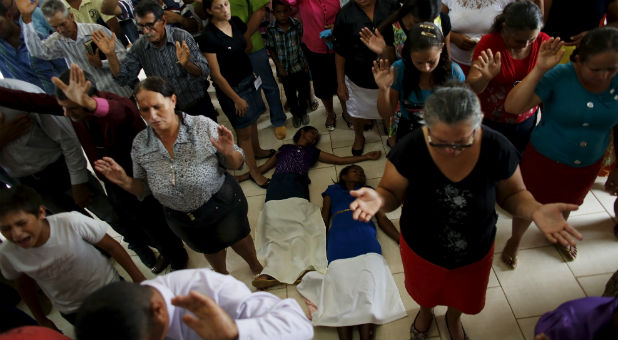Revival Fire Catching in Brazil as Believers Exchange Immorality for Salvation
Pastor Marcio Antonio stands at the pulpit in a one room evangelical church built precariously above barbed wire fences and illegally hung electrical cables, exhorting his flock in a Brazilian favela to improve their morals.
A former drug dealer in Cantagalo, an informally built hillside settlement where most residents lack official property rights, Pastor Antonio and his flock at the Assembly of God Church are part of a growing trend.
Evangelical churches are expanding rapidly in Brazil, home to the world’s largest Catholic community, especially in poor favelas, experts and parishioners said.
These communities, which developed from squatter settlements, often do not have the same services as formal Brazilian neighborhoods in terms of healthcare, sanitation, transportation or formal property registration.
“The government doesn’t help us so God is the only option for the poor,” Pastor Antonio, 37, told the Thomson Reuters Foundation following his Sunday sermon.
Wearing a white linen robe over a black shirt and tie, Antonio was born and raised in the favela where he preaches to a congregation of two dozen from a clean, one room church with a tiled floor and fans buzzing overhead.
Like other poor young men, the lure of easy money drew him to the drug trade before he found God and a new mission.
“There are a lot of problems here in the favela,” said Antonio, eating plain white bread and drinking black coffee after a two-hour sermon. “Poverty, a lack of work, crime, mental health issues—the church helps with these things.”
In favela communities where the state often doesn’t have much of a presence, evangelical churches are gaining members partially by providing social services like education, security and economic development, analysts said.
With conservative outlooks on birth control, abortion and other issues, the rise of evangelical churches drawing a base from poor communities is shifting Brazil’s political landscape to the right.
State Absence
Protestants, many of whom are evangelical, comprise more than 20 percent of Brazil’s 200 million population, up from less than three percent in 1940, according to the Pew Research Center, a U.S.-based demographics organization.
In favela communities, the proportion of evangelicals is generally higher, sometimes about 50 percent, said Jeff Garmany, a lecturer at King’s College London’s Brazil Institute.
“People in favelas are dealing with serious issues of stigma, poverty and violence,” Garmany told the Thomson Reuters Foundation.
“The state’s inability to adequately deal with these issues allowed the churches to grow and make inroads with people.”
With more than 20 percent of Brazil’s big-city residents living in informal favelas, the growing sway of evangelicals among the working poor has translated into political power.
“The evangelical churches aren’t just providing religious services in the favelas, they’re addressing social issues people are dealing with head-on,” Garmany said.
In Cantagalo, one of three inter-linked favelas in southern Rio de Janeiro with a combined population of about 30,000, there are two catholic churches and more than 15 evangelical churches, PastorAntonio said.
In Rio de Janeiro, Brazil’s second largest city, known for samba parties and skimpy bikinis, an evangelical bishop who opted to skip the city’s raucous Carnival celebrations, was elected mayor last year.
Marcelo Crivella, founder of a mega-church, won much of the working-class vote despite being derided by some for controversial comments on Catholics and homosexuals.
Crivella’s office did not respond to repeated interview requests from the Thomson Reuters Foundation.
Crivella has pledged to improve public services such as transport, health and education rather than using the mayor’s office to push his conservative religious views.
Safety in Numbers
But analysts say his election, along with the impeachment of former left-leaning president Dilma Rousseff, signals a shift to the right in Brazilian politics. This is in turn linked to the growing power of evangelicals who draw disproportionate support from the urban poor, analysts say.
Part of the unique appeal of evangelical churches for favela residents is the sense of belonging and security they provide, worshippers said.
“We are like a family,” said Luana de Souza, a housewife and member of Cantagalo’s Assembly of God Church following chants of “hallelujah” from other parishioners.
“The church helps out with things like finding work and education,” she told the Thomson Reuters Foundation.
De Souza, like pastor Antonio and most other worshippers at this church is of Afro-Brazilian heritage.
Afro-Brazilians make up a large portion of the people living in favelas and face disproportionate levels of violence and harassment from the police, according to Human Rights Watch.
For worshipper Laiana Almeida, a babysitter who moved to Rio from Brazil’s poorer north east three years ago, the reason for the growth of evangelical churches in favelas is simple.
“What the world can’t provide us, the church provides,” said Almeida following the Cantagalo service. “The church gives me things the physical world cannot offer.” {eoa}
© 2017 Thomson Reuters Foundation. All rights reserved.
















































